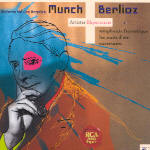Ah, Munch and Berlioz! What a thrilling combination. This disc consists of: (a) Munch’s second and finer–both in terms of playing and sound–BSO Fantastique, dating from 1962; (b) the mono 1955 Nuits d’été marvelously sung by Victoria de los Angeles; (c) the entire disc of what used to be called “Berlioz Overtures” when it appeared singly many moons ago; and (d) the “Queen Mab” scherzo from Munch’s stereo Romeo and Juliet. Anyone who cares about Berlioz already owns some or all of these performances, but the value in this particular set lies in making the symphony, in one of its very greatest interpretations, generally available once again. If you have any doubts about Munch’s mastery of this music, just check out that finale, or the breezy, blustery Corsaire overture, or the wild Royal Hunt and Storm from Les Troyens, or . . . well, you get the picture. Inimitable, essential, wonderful. Hideous covers though, for this whole series. Who approves these things? [11/5/2001]
































